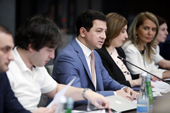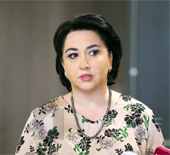
The parties to receive funding in accordance with the gained votes and other changes for 2020 parliamentary elections
By Nika Gamtsemlidze
Tuesday, August 6
The Speaker of the Parliament of Georgia, Archil Talakvadze held a briefing dedicated to the changes in the Election Code of Georgia. As Talakvadze noted, the ruling party has already prepared draft constitutional amendments for which third round of consultations will begin with the opposition, NGOs and diplomatic corps. According to these changes, elections in 2020 will be held in proportional order, with zero threshold.
Apart from the proportional system, the changes in Electoral Code introduced by the Speaker of Parliament include: changes in funding of the parties, airtime allocation between political parties, changes in financing of election campaign etc.
As Talakvadze noted, the party funding system will be replaced by a fair and objective model, which means that “the party that wins at least one mandate will receive funding in accordance with the votes received, with a new, transparent and easy-to-understand formula.” He also noted that small parties will receive relatively more funding.
Also, to encourage women’s inclusion in the Parliament, the parties which have women as every third member on their list, will still receive 30% extra financing.
Speaker also noted that these changes proposed by the ruling team will require the support of the opposition and sharing of responsibility from them.
As he noted, by holding the elections with the proportional system, the ruling team “refused the advantages that we had.” According to Talakvadze, the decision was made to ensure “democratic, balanced and calm political future.”
Talakvadze also talked about the importance of depolarization in the Parliament, according to him, the management team consolidated the proposals and suggestions made at previous meetings and drafted a package of amendments to the electoral law that were sent to the participants a week before the meeting. According to him, the aim of the ruling team is to make changes to the Electoral Code and electoral legislation with wide involvement.
The Chairperson of the Parliament also stressed that the Central Election Commission (CEC), as well as lower-level election commissions, will be staffed by 13 members, seven of whom will be chosen by political parties “so that the opposition will be guaranteed more seats than the ruling party.”
He also stressed that party registration for the 2020 elections will be possible with the signature of 5,000 supporters, in addition, the mechanism for verifying the lists of supporters will be simplified.
The Speaker thanked the US Government, the United States Agency for International Development (USAID) and the International Foundation for Electoral Systems for supporting the work process.
As the representative of opposition party European Georgia, Otar Kakhidze noted, his party is ready to support proportional system, “although we have suggestions for further refining the changes.”
Eka Beselia, an independent MP and the former member of the ruling party, noted that she “hopes that the authorities will consider the recommendations,” because the elections of 2020 will be the most “principled elections since 2012.” Beselia also stressed that she agrees with all the recommendations issued by the OSCE/ODIHR.
As the Chairperson of the Legal Issues Committee of the Parliament of Georgia, Anri Okhanashvili noted, that “for the ruling team, these changes mean giving up their own advantages.”
According to him, the purpose of the amendments is to introduce "fair game" rules. Okhanashvili also noted that the government fully supports the OSCE recommendations, which will have a “positive impact on strengthening democracy in the country.”
On the other hand, as one of the leaders of United Opposition, Giorgi Vashadze noted, the government's initiatives on amendments to the Election Code aim to “split up the united opposition.”
As human rights defender and the Executive Director of women's rights Union ‘Sapari,’ Baia Pataraia wrote on her personal Facebook page, “nothing is happening to ensure the involvement of women in politics.”
She also talked about the initiative to finance parties with women as every third member in their list and said that “there is nothing new in this initiative, it has been around for years now.”
Members of the Working Group on Electoral Legislation Reform a will be discussing the proportional and zero-barrier parliamentary elections of 2020, as well as the recommendations of the OSCE/ODIHR for two days.
The Parliamentary Elections of Georgia are to be held in the October of 2020, as announced by the ruling party. To ensure diversity of the parliament, for the first time, the elections will be held with proportional system and zero threshold.



